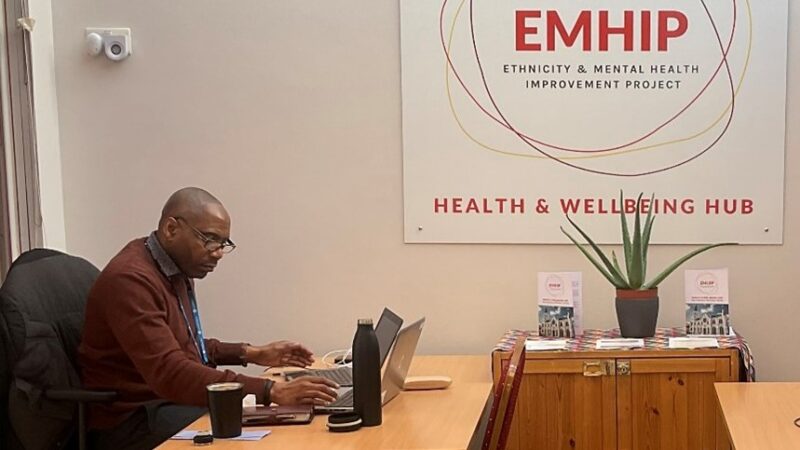NHS statistics show that if you are black, you are four times more likely to be subject to a restrictive mental health intervention than if you are white. There are health inequalities in access to mental health support and treatment too. The Ethnicity and Mental Health Improvement Project (EMHIP) is transforming the landscape of mental health care in Wandsworth.
The launch of EMHIP follows decades of campaigning by the community, led by Malik Gul, Director of Wandsworth Community Empowerment Network, and writer and academic, Dr Colin King. The project has been developed in partnership with South West London and St George’s Mental Health Trust and NHS South West London.
The first initiative is a health and wellbeing hub in the New Testament Assembly Church, Tooting, which brings mental health support to the heart of the community. It is a safe space that cares for people who aren’t accessing services through traditional NHS routes, enabling them to have conversations about life’s challenges and find support. In keeping with the hospitable nature of the hub, service users are referred to as guests.
Services include mental health and wellbeing clinics, diabetes checks, smoking cessation, weight management sessions and couples and family support. It also provides advice on debt, housing, welfare benefits and drugs and alcohol dependency.
Rather than moving the location of existing services, this hub is about creating completely new ones, which are culturally adapted, as well as offering a bridge to other NHS and community services.
The work is also about empowering and offering training to members of the community in having conversations about health and wellbeing. Known as ‘community embedded workers’, they encourage people to access the hub and can be anyone with a local role – church pastors, or Imams, or local hairdressers and barbers, for example.
Even during an ongoing pandemic, the hub is supporting people who may not have received help otherwise. GPs have started to refer to the service and it has already held multiple clinics. It will host its first mental health outpatient clinic with a psychiatrist in April, and with the lifting of Covid restrictions, begin welcoming more guests.
The project is working with service users to coproduce an evaluation criteria tailored to the project, as a robust methodology to monitor a demonstrate reduction in ethnic inequalities in mental health.
EMHIP is now embarking on its second year in Wandsworth, which will see the introduction of more new initiatives. We are now developing similar projects in Croydon and Merton. The other elements of the plan are set out in the EMHIP key intervention report.
1. More varied and culturally appropriate services
- Expanding the choice for people experiencing crisis: through introducing Crisis Family Placement Service, providing the opportunity for people to be supported in the community and avoiding unnecessary inpatient admission.
- Better support for people with serious mental illnesses, including targeted and tailored interventions, particularly for young black men.
2. Reducing restrictive practice
- Including patients in decisions made about their own care through the introduction of shared decision making practices to reduce restrictive and coercive practices
- Ensuring compliance to the new Seni’s Law which seeks to restrict and regulate the use of restraint, control and force in mental health settings
3. Improving the inpatient experience
- Expanding the access that local communities have in the care and support for people in inpatient care, helping to maintain connections and familiarity with local community assets and support.
4. Develop culturally capable workforce
- The development of a training package informed by the lived experience of using our services in Wandsworth and wider SWL to ensure that every employee of the NHS has awareness and the skills to support and care for everyone in our community with dignity and respect.
